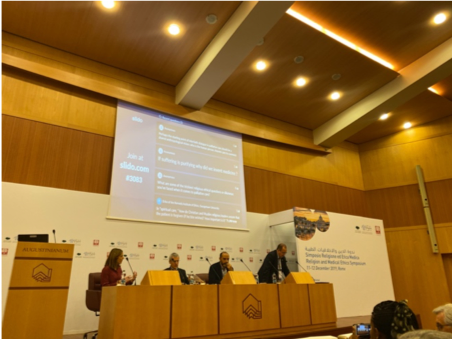My name is Mooza Al-Hail, and I am a first-year medical student at Qatar University. I was honored to attend the recent Religion and Medical Ethics Symposium organized by the World Innovation for Health (WISH) and the Pontifical Academy for Life at The Vatican, and I would like to share my perspective on attending the event.
This symposium was extremely informative and useful to me. It highlighted many important issues, and I feel that knowing them now as a medical student will help prepare me for being a physician and facing these issues in the future. The symposium opened my eyes to aspects of medicine that I never thought about before, like palliative care and elderly care. These are not things that I had not been thinking about because in my mind I have been focused on learning about medicine and the cure to disease, but in this symposium I learned that sometimes there is nothing more to do medically, therefore, my role as a doctor would be to just be there, to heal not to treat, to give them time and attention, and to provide love.
During the symposium, multireligious approaches regarding ethics were discussed which will help me in the future, because my home country of Qatar is somewhere that hosts many nationalities and religions. What amazed me is that different religions have very similar perspectives and approaches to healthcare. But still, ethics is a very large subject and there is no guideline that fits everyone. Each person is unique and all should be respected.
When treating someone the doctor should take into consideration the person as a whole: physically, mentally, and spiritually. In the symposium, we also considered the clinical aspect of treating the elderly. What was interesting to me was that in some cases doing less is more, meaning that treatment could do more harm than good. I also learned more about the mental health of the elderly, learning specifically about the meaning of dementia as well as Alzheimer’s, and their symptoms.
Mental health is a rising concern worldwide, so the symposium offered a great opportunity for me to expand my knowledge in this sector. It was especially important to consider the difficulty of diagnosing and treating mental health patients, as well as the difficulty of understanding what is good or bad for them. In conclusion, the religion and medical ethics symposium was a marvelous opportunity for me as a medical student to be surrounded by an extremely diverse, educated, humble group of professionals and learn from their experiences.
This symposium offers a head start for me as I plan a career in medicine. I have a lot to look forward to in the future and want to continue exploring the topics discussed at the symposium, as part of my efforts towards being a doctor who considers humane approaches to patient care.
